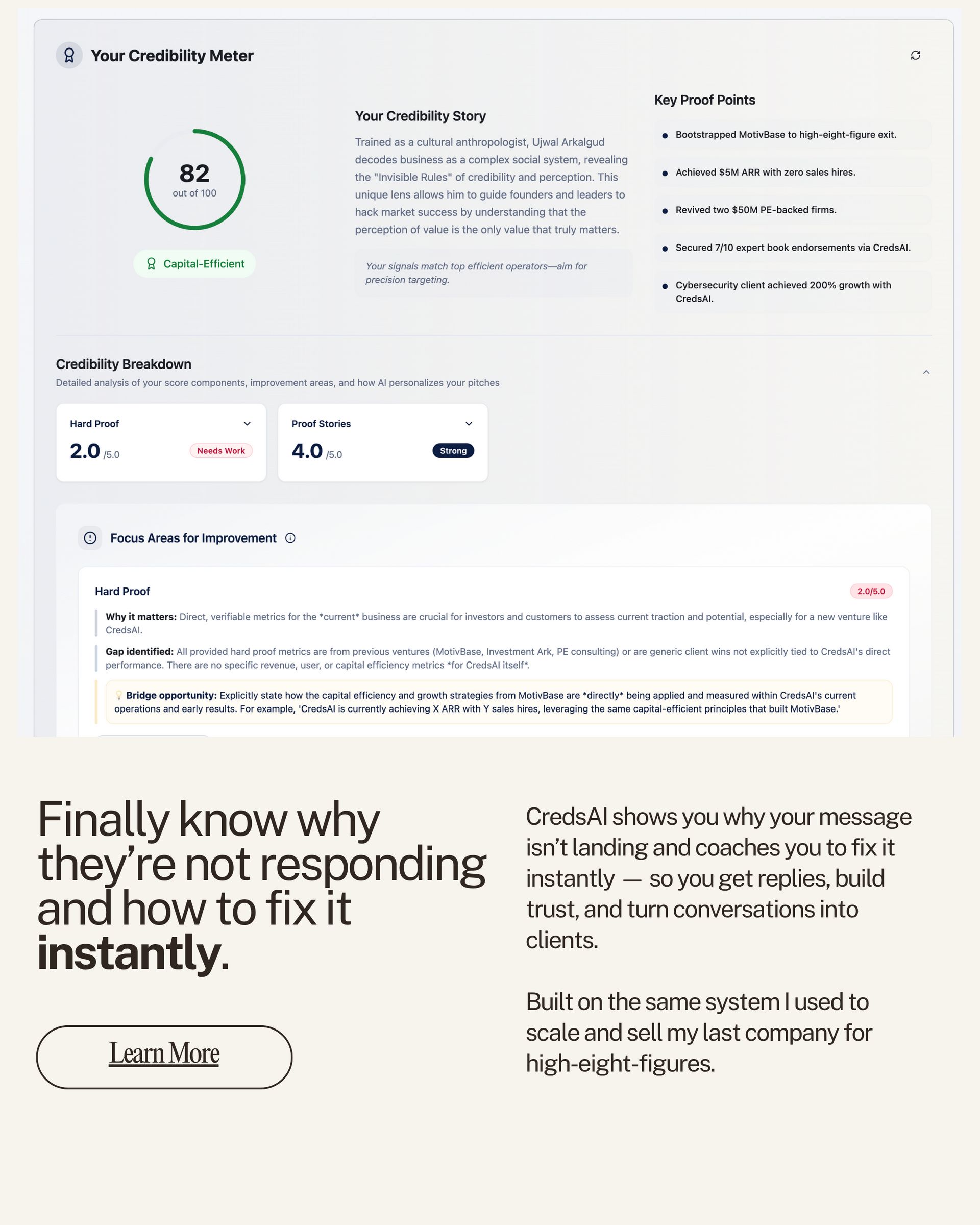- Invisible Rules
- Posts
- The 3 Most Painful Jobs in Your Startup
The 3 Most Painful Jobs in Your Startup
And why you, the founder, must do them yourself (if you ever want to get past your growth hurdles)
TLDR; Conventional wisdom says to hire a "Head of Sales" and "fractional CFO" the second you get funding so you can be the "visionary founder." Adorable. That's a trap, and it's why you're stuck at $1M ARR (or struggling to even get there).
Before you have a repeatable engine, your goal isn't "vision"; it's survival. You shouldn't be hiring specialists at all. You should be hiring scrappy generalists. And your job, as the founder, is to personally own the three most painful, unglamorous, and "unscalable" jobs in the company.
Why? Because the stuff you're trying to outsource is the entire damn business.
In this issue, we'll tackle:
Why hiring specialists before you have a proven playbook is just "performing success" (and guarantees failure).
The 3 most painful jobs in your startup (and why you, the founder, must be the one to do them).
The "Points of Bleed" test: How to stop hemorrhaging cash and see your business like a buyer.
The $1M Generalist Rule: How to hire a team that actually helps you scale.
Let's dive right in.
What’s the first thing most founders do when they land their first big check? They sprint to hire a "Head of Sales" with a legendary Rolodex, a "fractional CFO" to "handle the numbers," and their first "Head of Customer Success" to "own" the clients.
It feels great. It looks amazing on LinkedIn. You’re finally a real CEO.
You’re also, almost certainly, failing.

Gif by Bounce_TV on Giphy
This isn't building a business; it's performing success. You're following an invisible rule from the VC playbook that says "hire specialists to look scalable." But you're just scaling your own ignorance.
Before you have a repeatable engine (and for many, this is well past $1M ARR), your job isn't to sit in a glass office and "strategize." Your job is to be the Chief Generalist. You need to hire other generalists—scrappy, adaptable, "figure-it-out" types.
At my last startup, our first "generalist" was a brilliant researcher who could also handle client calls, demo the product, and assist with back-office deal prep. That's a generalist. That's who you hire.
And you, the founder, must personally own the three most miserable, soul-crushing, and painful jobs in the company. Why? Because these jobs are the company. They're where you learn, and they're the only places you can find and fix the problems that will kill you at scale.
If you outsource them, you outsource the learning.
1. The Pain of Prospecting (a.k.a. The Wall of Rejection)
Why it’s painful: Let's be blunt: Prospects don't want to talk to you. Your product is new, you have no credibility, and you're the 50th vendor to slide into their DMs this week. This job is 98% "no," "unsubscribe," or the deafening silence of a ghost. It’s a daily, high-volume IV-drip of rejection that feels personal every single time.
Why you can't outsource it: You hire an SDR or, even worse, a "rockstar Head of Sales" because you're "hiring ahead of growth." What happens? The SDR runs your generic script, gets generic rejections, and reports back, "tough market." The "Head of Sales" is, of course, too senior to make cold calls themselves, so they start "building a strategy" which... shockingly... involves hiring more SDRs. Congratulations, you've just set a giant pile of money on fire.
A founder on that call doesn't just hear "no." You hear the nuance. You hear the hesitation. You hear them say, "We already use [Competitor X]," and you can instantly pivot to, "That's why we're different. They solve that problem, but we solve this one."
An SDR can't do that. That "Head of Sales" doesn't know the product's soul yet. Neither has your passion. Neither can iterate the entire company's messaging on the fly. Early sales isn't a "numbers game"—it's a goddamn reconnaissance mission. Outsourcing it is like sending a private to do a general's job.
2. The Pain of Customer Success (a.k.a. The Wall of Demands)
Why it’s painful: You closed the deal! Hooray! Now the real pain begins. Your first customers are, to put it kindly, relentlessly demanding. They constantly want to give you feedback, and they want better and better... right now. They're needy. They're frustrated. They're using your product "wrong" and blaming you for it. It's emotionally draining.
Why you can't outsource it: You hire a "Head of CS" to "handle" them. That manager's job is to keep the client happy, which usually means logging a ticket and saying, "I'll pass that feedback to the product team!"
This is a flat-out catastrophe.
Those complaints aren't "support tickets." They are your R&D lab, and you're paying them to be in it. Every angry email, every "this is stupid," every "why can't it just do this?" is a flaming hot, 100% free data point on how to find product-market fit.
The founder needs to feel that pain directly, in your bones. You need to be the one on the call, listening to them rant, so you can see the pattern they can't. You're not just "managing a customer"; you are decoding the invisible rules of their workflow and building your product roadmap in real-time.
3. The Pain of Financial Control (a.k.a. The "Points of Bleed")
Why it’s painful: Most founders don't really understand how to pay attention to cash flow. They think "financial control" means looking at their P&L once a month. This job is the opposite. It's meticulous, boring, and terrifying.
It's not just "What did we spend?" It's "What did we get in return?". It’s you, tracking that "extra couple of hours" a team member spent to service a client and realizing that your true Cost to Service (CTS) just made that "enterprise" client grossly unprofitable.
Why you can't outsource it: You hire a bookkeeper or a "fractional CFO," and they give you a clean P&L. That's not financial control; that's just accounting. That's historical fiction.
Financial control is you, the founder, obsessively tracking your true unit economics. It's knowing that when a client call runs 30 minutes over, or your engineer spends "a couple extra hours" on a specific client's integration, those hours just became part of your Cost of Goods Sold (COGS). Did you just destroy your margin on that deal? Most founders have no idea.
These "points of bleed" are where your business model either works or dies. An untracked "point of bleed" isn't just a rounding error; it's a liability.
When an investor or a future buyer looks at your business, they're not just looking at revenue; they're hunting for these liabilities. An outsourced CFO can't find this bleed. They're not in the trenches. They don't know your operations. Only you can.
The $1M Generalist Rule
So, what's the fix? It's painfully simple.
Stop hiring specialists to do the jobs you hate.
Before you have a proven, repeatable sales and service motion (often >$1M ARR), you hire generalists. You hire smart, scrappy, founder-minded people who aren't afraid to wear five hats. You don't hire a "Head of Sales"; you hire someone who is smart, loves the product, and is willing to get on the phone with you. That's it. That's the "hack."
The specialists come after you've built the playbook.
You hire a Head of Sales after you've personally figured out how to sell.
You hire a Head of CS after you've personally figured out what makes customers stick.
You hire a CFO after you've personally proven the business model isn't a leaky bucket.
Hiring specialists too early isn't scaling. It's abdicating. It's cowardly. You're outsourcing your one and only non-negotiable job: learning.

My Provocative Question for You:
What's one "point of bleed" in your business (a time-sucking client, an expensive software subscription, an "unscalable" manual task) that you've been avoiding tracking because you're secretly afraid of what the answer will be?
Keep Reading



Reply